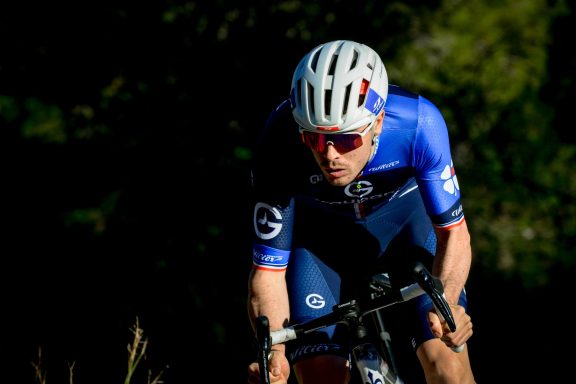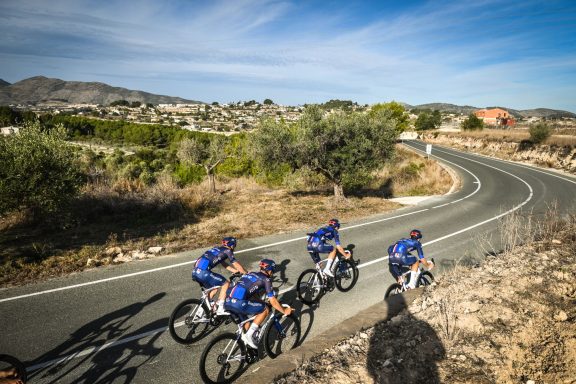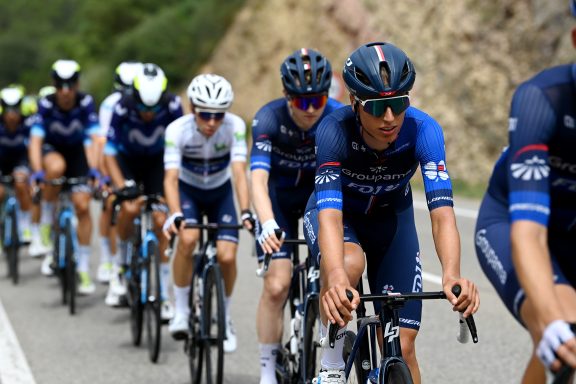The first rider in the organization’s history to jump from the Conti team to the WorldTeam (in 2019), Kevin Geniets is starting his seventh season in the professional ranks in 2025, with a further established status within the Groupama-FDJ cycling team. On Sunday, he makes his return to racing in the Grand Prix La Marseillaise, where he’s the defending champion. We took the opportunity to sit down with the Luxembourg champion.
How do you feel a few days before your return to racing?
I really had a very good winter. The preparation was very smooth, even if I changed coaches since Julien Pinot stopped training. I am now working with Nicolas Boisson, which necessarily brings something new. Overall, it was a winter quite similar to the previous ones, with just a bit of boost, which is always welcome. I went for a training camp with the team in Tenerife in early January, for twenty days, and it went really well. I am now used to this altitude camp, but we are constantly trying to improve on a few areas like nutrition or training and introduce a few things. Overall, it’s still in line with what we’ve been doing in the past few years. The process to come out from here in the best possible shape is very precise and I feel ready to race.
“When I was on enforced rest, I told myself: we usually really have a great life”
Before talking about 2025, let’s go back to 2024, the year of your first pro victory. What do you make of this season, which was already your sixth as a pro?
Obviously, I especially remember my first pro victory, in the Grand Prix La Marseillaise, which was a great moment and a reward for all the work done. You could say that it was a real weight off my shoulders. It was definitely a goal that I had for a while. I’d come close several times, with a second place here, a third place there, but I was always missing that little something. I was really happy to finally be able to pull it off, and it really boosted me for the races that followed. I really gained confidence, because when you don’t win, at some point, you start to wonder: “maybe I’m not capable of it”. It’s so hard to win; we’re at the highest level of the sport, there are so many strong riders. So when you win, you then tell yourself: “I managed to do it once, so I can do it again”. And the goal now is indeed to repeat it.
Your first part of the season stopped after a broken hand in Paris-Nice though.
The most frustrating thing about this is that I was really on top form when it happened. It really broke the momentum of my great start to the season. Now, I quickly put it into perspective as it was my very first proper injury, the first time I had been sidelined during my career. In the end, this sequence also did me good, because I was able to rest, take a step back from the races and the stress. On top of that, I was lucky to have the trust of the team and to keep my initial program, with the Critérium du Dauphiné and the Tour de France. I was really at peace mentally, and I was able to focus in order to come back gradually. I also took advantage of these few weeks to do something else, whereas we are usually always under pressure. I did simple things, like spending time with friends, sharing dinners. Since I couldn’t ride at the beginning and I love nature, I did a lot of walking, a bit of trail running. I also spent a bit more time at home with my girlfriend, which rarely happens in a season. It really revitalized me. I obviously don’t want to experience it every year, but I didn’t suffer too much from it.
You also said that this sequence made you remember why you wanted to become a professional rider. What did you mean by that?
When you are in your bubble and caught up in the whole process, from the winter when you work towards a goal, and then during the season when you go from one race to another, you never really have time to sit down, think and realize. When I was at home, on enforced rest, I told myself: “we really have a great life usually”. I enjoyed the moment, but I still wanted to come back fast. Usually, the winter is the period where you don’t do anything, and there are no races, nothing happens. But when it’s time for the biggest races and you have to watch them on TV, that’s when you really miss it.
“I feel like I have my place in this team”
Speaking of big races, you took part in your third Tour de France and then went on with the Vuelta.
The Tour went well, the form was good even if there were no big results because the breakaways often did not go all the way. I went to the Vuelta with very high motivation because I came out of the Tour in very good shape. I immediately “switched” mentally, and I was in great shape at the start of the Vuelta. Unfortunately, I don’t cope with the heat very well and we had extreme temperatures for ten days. At some point, I could no longer recover. My body did not tolerate this heat and I found myself completely empty and I was forced to abandon. It was very hard to accept mentally because I spent days struggling just to see the finish line while my level is normally much higher than that. It was very frustrating because I committed a lot for the Vuelta, and it did not pay off at all. But that’s also part of sports. We all work really hard, but we are not always rewarded. It wasn’t easy to get back on track for the end of the season. Sometimes you feel like giving up, but in the end, you pull yourself together, as you always do. I got back into it and finished with a nice Paris-Tours. Overall, it was still a good year.
In 2024, you also extended your contract with the team. Was that a no-brainer?
I like my role here. At the start of the season, I can sometimes ride for myself, which really does me good, but I also really like my role as a domestique. It’s something I really enjoy, especially on the Grand Tours. I have great memories of the Tour de France where David finished fourth, and the plan is to repeat that in the near future. I feel like I have my place in this team, I feel respected, I really try to give the best of myself, I think they see it and that I bring something. I was really happy to extend for three more years.
“I need to use this start of the season to play my cards right”
You’re coming back to racing on Sunday, where you’ll be wearing the number 1 bib.
It’s special, of course. I can already feel it because I’m being called every two days for an interview, and I’m not really used to that. That being said, I was really focused on the work I had to do in Tenerife. I’m trying not to think too much about the Grand Prix La Marseillaise but rather about the next races, to go there without pressure. Maybe that’s the key to success. I’m not really thinking about defending my title. I’m more looking at the start of the season up to Paris-Nice as a whole. I would like to win a race again, but I want to take it step by step.
Will you have the form to be up there straight away?
I think so. Last year we had the same goal, and everything was perfectly planned. I had a bit less workload at the end of the training camp in order to be really competitive from the start of the season. I felt very good during the training camp in recent weeks, and the team has enough knowledge to make sure that I come on the first races with the form I want. The goal is for sure to take advantage of the start of the season to seize opportunities. I often race with the big leaders, and in this set-up, I know very well that I do not have the same possibilities or the same role, and I completely accept that. But I need to use this start of the season, like last year, to play my cards right.
What will your calendar be for the first part of the season?
It will be the same as last year, with the French races, then I will go to Paris-Nice and Milano-San Remo before taking a break and preparing for the Giro.
“The Giro with David is a very exciting project”
So you will put aside the Flemish Classics and do the Ardennes ones?
It’s difficult to fit the cobbled classics campaign into my program because I will return to altitude camp with David to prepare for the Giro as best as possible. It is a big goal for him, so we have a really global approach to the season. For sure I miss the Flemish races, I want to go back there, but I think that this year is the right year to try this program. However, I am already making an appointment with Flanders for next year.
Was it a wish from yours to discover the Giro?
I knew that David wanted to go to the Giro with the goal of fighting for the general classification. We talked about it with the team, and we agreed that I would go there too in order to support him as best I could. I really like working with David, we have already achieved great things together, and it is a very exciting project. Doing a great Giro is a challenge for him, but it is also a challenge for me as a domestique. It is almost the part of my work where I have the most fun, especially when I know that David is really at the top, as we have already seen on the Tour or in Paris-Nice. This is what really excites me. When we see his end of the 2024 season, it also gives us confidence and lets us think that the project really makes sense.
What is your relationship with David?
We very often have a similar race schedule, and I don’t think it is by chance. I like his way of racing, I think he also appreciates the work I do for him, and that is why he trusts me. We also experienced moments that bonded us strongly. I repositioned him when he won his stage on the Dauphiné, I could “save” him from some stressful situations on the Tour… All these shared experiences mean that we now know each other really well. I know how he works, he knows how I work, and my goal is really to allow him to get the most out of himself.
“The goal now is to win a big race”
Would you also like to seize personal opportunities on the Giro?
Breaking away on a Grand Tour is also a particular process. During my first years as a pro, we were only aiming for the GC with David, so I was almost never told to break away. Over the past two years, our approach has changed a bit, I’ve had to adapt, and I’m also getting better at taking this responsibility. Last year, I broke away on the Dauphiné, I broke away several times on the Tour. It’s really something you have to learn. When you learn it on the biggest stage, it’s for sure not easy, but I’ve progressed, and people saw me at the front on these big races. So of course, if there are any opportunities, I’ll try to break away and get a result for myself.
Is taking a breakaway and managing a day at the front something you need to work on?
You mainly learn in the race. At the beginning, you make mistakes. You want to be in the breakaway so bad, so you give everything at the beginning, it doesn’t go away, and when the right move goes, you’re already dead. You have to feel the right moments, understand the moves, point out the guys who often break away. I’ve learned from my last experiences, it’s something I like now, even if in the end, it’s often the peloton that decides whether the breakaway goes all the way or not. We’re going to continue with this approach, I’m going to continue, and hopefully one day the stars will align.
How do you approach the rest of your career?
For now, I really like what I do. I want to keep improving and thriving in my various roles as I am doing at the moment, sometimes playing my card, having that end-of-race adrenaline, and having this very important role for a leader on the biggest races. I have always had goals. When you are young, you first have the goal of becoming a professional, then you have the goal of doing the Tour de France. Then I had the goal of winning a race. Now, the goal is to win a big race, for example a stage of a Grand Tour or a WorldTour stage race. It is the next step, and you need to believe in it. When I was young and I said I wanted to do the Tour, it seemed almost impossible, but I succeeded. A stage of a Grand Tour seems difficult, although it is less impressive than at the very beginning, but you always have to find new challenges, and this is the one that will drive me in the coming years.


